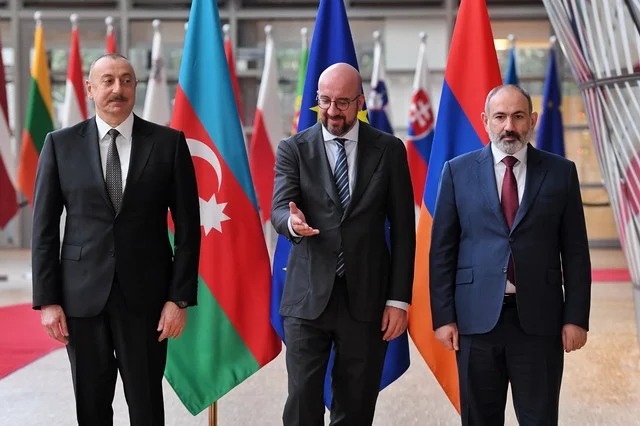Azatutyun.am. The European Union has replaced Russia as the lead player in international efforts to broker peace between Armenia and Azerbaijan, an EU official claimed on Friday.
The official, who did not want to be identified, also confirmed that the EU will not work with Russia on resolving the Nagorno-Karabakh conflict or sponsoring confidence-building measures for that purpose.
“There is no movement between the EU and Russia on this and no intention to engage with Russia on this,” he told RFE/RL’s Armenian Service.
“Russia might have stopped the [2020] war between the two parties, but it is clear that the follow-up is taking place here in Brussels and not in Moscow. The reason why they [the leaders of Armenia and Azerbaijan] came to Brussels so quickly is a sign of this,” added the official.
Read also
The head of the European Council, Charles Michel, has hosted three trilateral meetings with Armenian Prime Minister Nikol Pashinian and Azerbaijani President Ilham Aliyev in the last five months.
After the most recent meeting held in Brussels on May 22, Michel said Pashinian and Aliyev agreed to “advance discussions” on a peace treaty and press ahead with the demarcation of the Armenian-Azerbaijani border and opening of transport links between the two nations.
Russia has denounced the EU’s mediation efforts, saying that they are part of the West’s attempts to hijack Armenian-Azerbaijani peace talks and use the Karabakh conflict in its standoff with Moscow over Ukraine.
Russian Foreign Minister Sergei Lavrov charged in April that the West is now ready to “sacrifice interests of the Armenian side” in the intensifying geopolitical conflict. He said the United States and France stopped cooperating with Russia within the framework of the OSCE Minsk Group, co-headed by the three nations, following the Russian invasion of Ukraine.
The EU official noted in this regard that the joint mediation format established by Moscow, Paris and Washington nearly three decades ago is “not valid any longer.”
The official said that both Yerevan and Baku are now “very scared of Moscow” because of the war in Ukraine. “They are very aware that they can be next,” he claimed.
Pashinian and Aliyev briefed Russian President Vladimir on the results of their May 22 talks in separate phone calls earlier this week. The Armenian and Azerbaijani foreign ministers assured Lavrov earlier that their governments remain committed to Armenian-Azerbaijani agreements brokered by Putin during and after the 2020 war in Karabakh.
The also agreements commit the two sides to demarcating their border and opening it to commerce, travel and cargo shipments. They stipulate that Russian troops will ensure the safety of a road and railway that should connect Azerbaijan with its Nakhichevan exclave through Armenia’s Syunik region.
The EU official revealed that the EU hopes to “gradually change this” in the future. “But there is no doubt that this is a long shot,” cautioned the official.
A Russian-Armenian-Azerbaijani commission dealing with practical modalities of the planned transport links was due to meet in Moscow on Friday for the first time in almost six months. Armenian and Azerbaijani officials are also expected to travel to the Russian capital later this month for further talks on the border demarcation.
Putin and Pashinian reaffirmed Russia’s key role in the Karabakh peace efforts in a joint declaration issued after their talks held outside Moscow on April 19.
The EU official also said that the status of Nagorno-Karabakh and the security of its population will be on the agenda of Armenian-Azerbaijani negotiations.
“It is inevitable that this will be on the table at some point but they are not there yet,” explained the official. “This is a topic for the later stage as it will be the most difficult issue. There is no point in frontloading this issue right now.”
Reacting to Michel’s comments made after the May 22 summit, Karabakh’s ethnic Armenian leaders accused the head of the EU’s main decision-making body of signaling support for Azerbaijani control over the disputed territory. One of them said on Tuesday that the EU is unfit to be the lead player in brokering a peaceful settlement.
A spokesman for Michel said afterwards that his comments “should not be interpreted as favoring a predetermined outcome of discussions” on Karabakh’s future.





















































